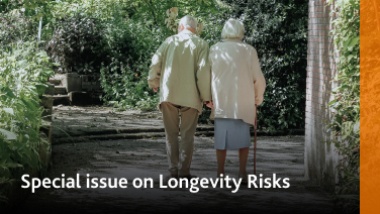Editorial
Editorial of Health and Ageing newsletter 33
1 FINANCIAL SBILITY AT ION NEWSLETTER HEALTH AND AGEING Editorial by Christophe Courbage It is my pleasure to introduce this new issue of the Health and Ageing newsletter of The Geneva Association. Not only does it bring to readers various contributions linked to the topics of health and ageing as related to insurance, but it also presents some important future activities of the Health and Ageing research programme. Two of them deserve special attention. The first activity is the forthcoming Health and Ageing conference of The Geneva Association, the 12 th in its annual conference series. It will take place in Singapore on 17–18 November 2016, hosted by the Singapore College of Insurance and supported by Asia Capital Re. The theme of the conference is ‘Insuring healthcare for the elderly in Asia’. The detailed programme provided on page 23 of this newsletter shows how fortunate we have been this year to have together such prominent speakers on topics such as longevity and health determinants of the elderly, health care and new health technology for an ageing population, financing health care for the elderly and insurance solutions and opportunities for elderly health coverage, all these topics being addressed under the angle of Asia. The second important activity of the Health and Ageing research programme is the publication of the October 2016 special issue on health of The Geneva Papers on Risk and Insurance—Issues and Practice. I am very privileged to co-edit this issue with John Nyman, Professor of Economics at the University of Minnesota. All interested parties are encouraged to submit a paper for this special issue, the deadline being 9 December 2015 (see the call for papers page 24). This newsletter also comprises various contributions addressing a wide range of topics, which I would like to briefly present. The first contribution, by Steve Woods and Marcy Updike, discusses U.S. health exchanges, i.e. a virtual shopping area in which individuals or employees purchase a health insurance product online, whether public or private. They look particularly at the ways senior people perceive these exchanges, how comfortable they are with buying health insurance products online and how these health exchanges should adapt to senior consumers. The second contribution, by Anke Walendzik, Florian Buchner and Jürgen Wasem, discusses the conditions of competition within the private health insurance system in Germany and their potential adjustment. In particular, they investigate how to implement an economically consistent system of transferability of ageing provisions to enhance competition within the private health insurance system. They identify three types of model and compare their pros and cons. The third contribution, by Asako Ohinata and Matteo Picchio, investigates whether the introduction of the Scottish Community Care and Health Act 2002 offering free personal elderly care crowded out private savings. They found that the act reduced precautionary savings, possibly leading to a situation in which there is less than full insurance against long-term care for the elderly. It therefore questions the effectiveness of universal elderly care insurance in addressing the large and volatile risks of long-term care for the elderly. The fourth contribution, by Shirley L. Porterfield and Huei-Wern Shen, explores the effect of providing informal care on health status and pension benefits in the U.S. They show that caring for a working-age adult with disabilities has a disproportionate and negative association with participation and value of savings held in pension plans, as well as on health status, highlighting the importance of finding long-term solutions to support caregivers. No. 33 October 2015 @TheGenevaAssoc HEALTH AND AGEING





